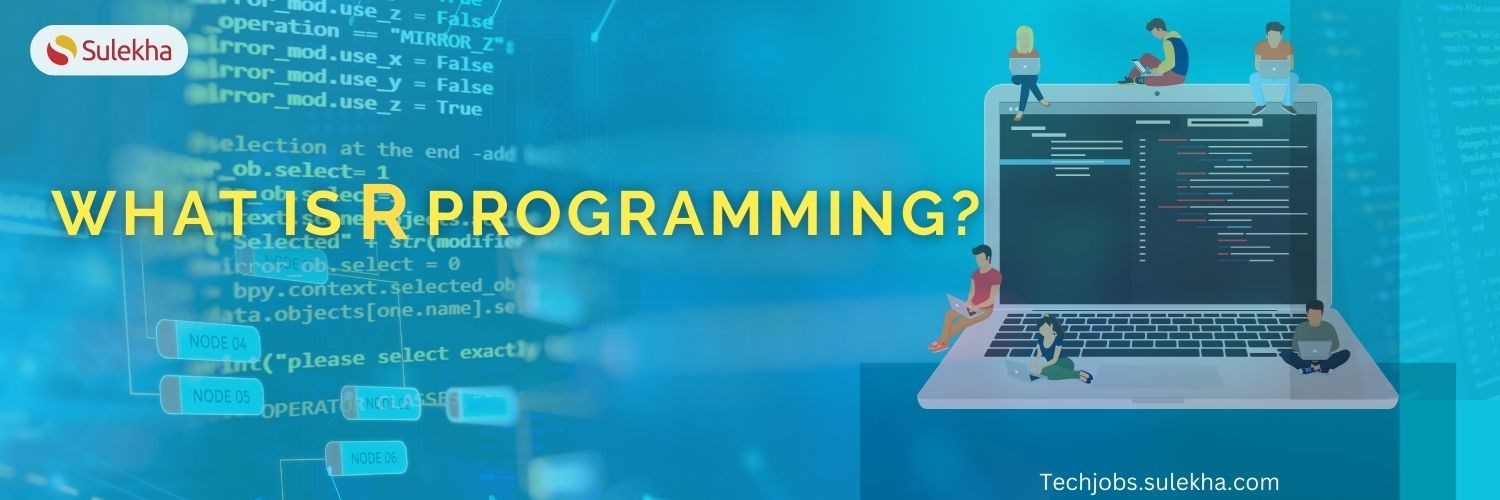What is R programming?

What is R programming?
R language was developed by Ross Lhaka, Robert Gentleman, and his team at Bell Laboratories (formerly AT&T). The R language was primarily developed for statistical computation and graphical data visualization of data. R is an environment suitable for doing statistical analysis and modular programming using functions. R language is an interpreted computer programming language used for computing, data representation, reporting and modelling.
Features of R
R is an open-source data analysis software meant to analyze statistical data
R is a well-developed, simple and effective language
R provides an array of statistical techniques, including time-series analysis, clustering, classification, statistical tests, linear and non-linear modelling, etc.
R can support several data types, including data frames, arrays, matrices, and frameworks.
R is popular and well-known for its high-quality graphic features. R allows its users to create detailed, customizable visualizations and plots
R can handle data manipulations, data calculations, and storage. R has efficient data calculation, data handling and data storage capabilities.
R has a comprehensive library with a vast collection of packages. The library package is available through CRAN (comprehensive R archive network). The library functionalities extend to several statistical and graphical techniques.
R has excellent community support for developers and users. R can extend excellent community support, documentation support, and tutorials.
R has excellent integration capability and can be integrated with programming languages and databases.
R has powerful data visualization libraries. Libraries like lot2, lattice, and Plotly help create interactive, dynamic and static visuals.
R can run and support several operating systems like Windows, macOS, and Linux.
R can support machine learning algorithms with packages like the caret, Random Forest, and boost.
R has a comprehensive environment to support statistical programming. R has tools for data cleansing, data analysis and data visualization.
R has extensive documentation and built-in files.
Why should you learn R programming?
There are several reasons why you should learn R programming.
R is beginner-friendly and easy to learn.
R has gained popularity in data science IT domains. R has become popular in the business domain due to businesses rely heavily on data
R is specifically designed for data analysis and statistics. If you aspire to pursue a career in data science or data analysis, you should learn R.
R is used widely in academia to teach statistics and data science. Learning R can help work with data, academic research, or to work and analyze personal projects.
If you have hands-on experience and knowledge of R, your career opportunities are bright. You can work in data science, data analytics, economics, IT, bioinformatics, health informatics, and many more domains dependent on data and data analysis.
What are the popular packages in R?
The popular packages in R are:
dplyr: Data manipulation.
ggplot2: Data visualization.
tidyr: Data tidying.
shiny: Building interactive web applications.
caret: Machine learning.
lme4: Linear mixed-effects models.
data.table: High-performance data manipulation
What are the popular communities in R?
The popular communities in R are:
Stack Overflow: R-specific questions and answers.
RStudio Community: Discussion forums for R and RStudio users.
Reddit: r/rstats for R-related discussions.
Career opportunities
R opens a plethora of career opportunities to all. Some of the career opportunities that you may look into are:
Data scientist, business analyst and data analytics: As data scientist and data analysts, you will analyze complex data and extract meaningful insights.
Research and academia: As a statistician, you can design experiments, analyze the data with statistical tools, and interpret results. You can also be an academic researcher who conducts scientific research or teaches or publishes findings.
Bioinformatics and researcher: You can work as a Bioinformatician and analyze biological data or as a clinical data analyst.
Finance and Economics: You can work as a quantitative analyst and assess the financial risks and opportunities. You can work as an economist and analyze the economic policies.
Machine learning engineer: You can work on machine learning algorithms.
Conclusion: R is an excellent tool for data analysis. Join our course on R programming to explore the subject in-depth.
Take the next step towards your professional goals in R Programming
Don't hesitate to talk with our course advisor right now
Receive a call
Contact NowMake a call
+1-732-338-7323Latest blogs on technology to explore

Drug Safety & Pharmacovigilance: Your 2026 Career Passport to a Booming Healthcare Industry!
Why This Course Is the Hottest Ticket for Science Grads & Healthcare Pros (No Lab Coat Required!)" The Exploding Demand for Drug Safety Experts "Did you know? The global pharmacovigilance market is set to hit $12.5B by 2026 (Grand View Research, 202

Launch Your Tech Career: Why Mastering AWS Foundation is Your Golden Ticket in 2026
There’s one skill that can open all those doors — Amazon Web Services (AWS) Foundation

Data Science in 2026: The Hottest Skill of the Decade (And How Sulekha IT Services Helps You Master It!)
Data Science: The Career that’s everywhere—and Nowhere Near Slowing Down "From Netflix recommendations to self-driving cars, data science is the secret sauce behind the tech you use every day. And here’s the kicker: The U.S. alone will have 11.5 mill

Salesforce Admin in 2026: The Career Goldmine You Didn’t Know You Needed (And How to Break In!)
The Salesforce Boom: Why Admins Are in Crazy Demand "Did you know? Salesforce is the 1 CRM platform worldwide, used by 150,000+ companies—including giants like Amazon, Coca-Cola, and Spotify (Salesforce, 2025). And here’s the kicker: Every single one

Python Power: Why 2026 Belongs to Coders Who Think in Python
If the past decade was about learning to code, the next one is about coding smarter. And in 2026, the smartest move for any IT enthusiast is learning Python — the language that powers AI models, automates the web, and drives data decisions across ind

The Tableau Revolution of 2025
"In a world drowning in data, companies aren’t just looking for analysts—they’re hunting for storytellers who can turn numbers into decisions. Enter Tableau, the #1 data visualization tool used by 86% of Fortune 500 companies (Tableau, 2024). Whether

From Student to AI Pro: What Does Prompt Engineering Entail and How Do You Start?
Explore the growing field of prompt engineering, a vital skill for AI enthusiasts. Learn how to craft optimized prompts for tools like ChatGPT and Gemini, and discover the career opportunities and skills needed to succeed in this fast-evolving indust

How Security Classification Guides Strengthen Data Protection in Modern Cybersecurity
A Security Classification Guide (SCG) defines data protection standards, ensuring sensitive information is handled securely across all levels. By outlining confidentiality, access controls, and declassification procedures, SCGs strengthen cybersecuri

Artificial Intelligence – A Growing Field of Study for Modern Learners
Artificial Intelligence is becoming a top study choice due to high job demand and future scope. This blog explains key subjects, career opportunities, and a simple AI study roadmap to help beginners start learning and build a strong career in the AI

Java in 2026: Why This ‘Old’ Language Is Still Your Golden Ticket to a Tech Career (And Where to Learn It!
Think Java is old news? Think again! 90% of Fortune 500 companies (yes, including Google, Amazon, and Netflix) run on Java (Oracle, 2025). From Android apps to banking systems, Java is the backbone of tech—and Sulekha IT Services is your fast track t